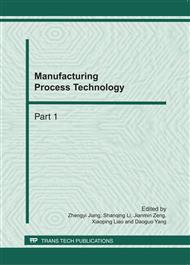p.311
p.316
p.321
p.328
p.332
p.336
p.340
p.347
p.351
The Effect of Complexing Agent on the Surface of Aluminum Alloy Plating Ni-P Alloy
Abstract:
In this paper, the effect of different concentrations of complexing agent on the surface of aluminum alloy plating Ni-P alloys is studied. Study the influence of malic acid complexing agents on the electroless Ni-P alloy deposition rate, morphology, corrosion resistance, and determine the optimal complexing agent concentration. The results show that when the malic acid concentration is 24g /L, the deposition rate gets to maximum, and coating uniformity, structure compact and corrosion resistance is best.
Info:
Periodical:
Pages:
332-335
Citation:
Online since:
February 2011
Authors:
Price:
Сopyright:
© 2011 Trans Tech Publications Ltd. All Rights Reserved
Share:
Citation:


